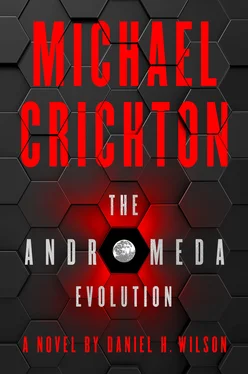The inhibitor had been utilized so far to protect low-orbit spy satellites and government rocket launches from atmospheric AS-2. This represented humankind’s first mastery over the strange, plastic-eating microparticle after decades of highly classified study in the laboratory. Now the time had come for Vedala to test her creation face-to-face against the first documented “wild” appearance of Andromeda. And she did not intend to fail.
It was nearly noon. Every other member of her team had already arrived, whisked away from their respective lives to the middle of the Amazon jungle.
All of them had been on time, except for one: James Stone, PhD.
As a roboticist, Stone’s skills were not mission appropriate. In Vedala’s estimation, he should have been replaced with a microbiologist or a bacteriologist. Any number of more multidimensional researchers would be better suited. And yet General Stern had been intransigent on Stone’s inclusion.
Standing beside a muddy river with no name, Vedala knew the stakes of this mission. She also knew its legacy. And thus she had her own idea of why James Stone had been forced onto her roster.
As Stone gathered his luggage, Vedala spit on the ground, turned, and walked away to inspect the hard-cases.
Vedala was an orphan and a self-made success. Her assumption was that James Stone, son of the famous scientist Jeremy Stone, had been included on her field team for a reason she could fundamentally never respect—his family pedigree.
Noon Field Briefing Noon Field Briefing Manifest Day 2: Wildfire Dawn Discovery Twenty-Mile Perimeter A Higher Analysis Incomplete Information Second Camp Day 3: Anomaly Night Ambush Alpha and Omega In the Morning Light Outcomes Indios Bravos First Contact Plan B The Anomaly Fail-Safe Day 4: Breach Operation Scorched Earth Dawn Strike Entry Primary Descent Evolutions Forensics Fight or Flight State of Emergency The Tunnel Best-Laid Plans Inundation Activation Day 5: Ascent A New Paradigm Finger of God Realignment Z-Axis Mission Preparation Destination ISS Docking Procedure Stone’s Theory Reunited Goodbyes Intercepted Transmission Super-Terminal Velocity Resolution Out of Eden Epilogue Footnotes References Keep Reading … About the Authors Also by Michael Crichton About the Publisher
PENG WU WATCHED THE THREE OTHER SCIENTISTS gather and check their luggage in the hacked clearing without saying a word. Though she of course spoke perfect English, and French and German for that matter, she found silence almost always to be the best response around her European and American colleagues. She had read the dossiers on her team (both the American and the Chinese People’s Liberation Army–supplied documentation), but had met them each just briefly.
Only the older African man, Harold Odhiambo, made her feel comfortable. He spoke slowly and with deliberation. And though he often wore a wry grin below thick round eyeglasses, he refrained from constantly flashing his teeth in glaring and pointless smiles.
Peng knew that with her keen intellect and piercing black eyes, she could appear severe to Westerners, especially civilians. She wasn’t bothered by it. In her estimation, their discomfort was due less to a cultural divide than to the simple fact of her military background and natural disposition.
When she was a small child in Zhengzhou, Peng’s parents were often gone—dispatched on various assignments for the PLA. Left in the care of her grandfather, she had begun to experience separation anxiety that soon blossomed into panic attacks. As a solution, the old man had introduced his granddaughter to the ancient game of weiqi (known as Go in the United States). He explained that life was like the game—and every word spoken, every emotion betrayed through gesture or expression, constituted a move. By controlling each of your moves, you could reduce anxiousness and win the game.
Peng Wu found that she very much liked winning, at weiqi and at life.
From those years on, Peng’s strategy had been to reach her goals in the fewest number of moves. Rising through the ranks of the People’s Liberation Army and undergoing intensely competitive astronaut training, she had learned to suppress her anxiety by choosing her actions carefully, and always with the express intention of accomplishing the mission. In this way, she had strategically chosen to marry an ambitious fellow soldier and had gained the full trust of her government and the military.
Peng turned her attention to a group of a dozen frontiersmen—native jungle specialists who had been hired to clear this landing area and accompany the field team on their expedition into the Amazon. The brown-skinned men blended traditional tribal adornments with modern military equipment. They worked together as a team with wordless efficiency, using the natural resources on hand to craft a base camp out of the raw clearing. Every step, every swing of the machete, was done with a familiar ease that spoke of lifelong jungle experience.
Meanwhile, the civilian scientists were still adjusting to life without their smartphones or the Internet.
Methodically breaking down her traveling backpack to separate out the extra scientific goods that could be hauled by one of the native porters, Peng resolved to stay close to the guides—doing so would maximize her survival probability and therefore the success probability of the mission as a whole.
“FINALLY, WE’RE ALL here,” said Vedala.
The Indian woman barely glanced in the direction of James Stone as he stomped across the muddy clearing, huffing and puffing, dragging a black plastic hard-case full of equipment. Wearing a brand-new khaki outfit, the roboticist was in his early fifties but looked younger. His face was already sweaty in the oppressive heat of high noon.
“Let’s begin,” she added.
Vedala stood under the low ceiling of a maloca—a simple thatch-roofed hut the guides had hastily constructed beside the gurgling brown river. A paper topographic map was spread across a folding table and weighted at the corners with muddy stones. Across from her stood the immaculately outfitted Peng Wu. The PLA Air Force major stood perfectly straight, with martial precision, trim and athletic in a long-sleeved jacket and khaki pants neatly tucked into her boots.
With her military bearing, Peng stood out in stark contrast to the much older Harold Odhiambo, a robust Kenyan man with close-cropped salt-and-pepper hair, a gently amused attitude, and a disheveled outfit complete with cargo shorts and an Australian bush hat with one side pinned up.
Odhiambo turned his kind eyes to Stone as the bedraggled man joined the group under the thatch roof.
“Welcome, Dr. Stone,” said Odhiambo, with an English accent. “I enjoyed your work on collision avoidance using low-resolution imaging. Very efficient.”
Stone was speechless for a moment, surprised that the famous xenogeologist would have bothered to read his work. Then he recalled that Odhiambo supposedly read everything , and with that, his manners returned.
“Thank you, Dr. Odhiambo. That’s very flattering. I apologize that I haven’t caught up with your latest—”
Vedala cut in.
“You can take that offline. Harold has dabbled in just about everything over his career,” she said. “Which is why he’s perfect for our mission. He’s not just a specialist.”
The words hung in the air long enough to be awkward before a modulated ringing interrupted.
“Back to the agenda,” she added.
Vedala picked up an Iridium satellite phone from the table. The chunk of black plastic was a restricted military model commissioned by the Defense Information Systems Agency (DISA). It had been ruggedized, weatherproofed, waterproofed, signal-encrypted, and fitted with a hot-swappable antenna adapter. Currently it was attached to a thin black antenna wire strung around the wooden poles supporting the hut. The ice-blue LED screen glowed coolly in the heat of the jungle, four out of four connection bars illuminated.
Читать дальше








